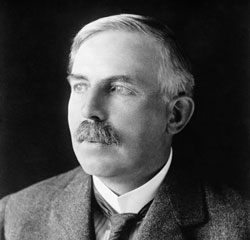CARA microbiologists - then and now
Issue: Biogeography
27 August 2013 article

This year, the Council for Assisting Refugee Academics (CARA) marks the 80th anniversary of its inception. William Beveridge, Ernest Rutherford, A.V. Hill and others founded the council in May 1933, and Albert Einstein’s lecture on academic freedom in London’s Albert Hall six months later promoted CARA’s aims to an audience of 10,000.
Many famous, and less-celebrated academics have benefited from CARA’s humanitarian and financial support to rebuild their lives after fleeing from the tyranny of a diverse range of countries and regimes. The origins, of course, were in the flight of Jews from Nazi Germany in the 1930s, and from this quarter many famous careers were built on the support provided by CARA in the UK, and The Scholar Rescue Fund in the US. Through the Cold War and latterly in the Middle East and Africa, CARA has continued to provide help to all those individuals who arrived at its door. A number went on to achieve great things in science (Hans Krebs and Max Perutz, for example) and in other fields.

The SGM joined with CARA in 2011 to set up an annual grant of £5,000 to support microbiologists who found themselves forced to shelter in the UK, and specifically to help them rescue their careers. This is a landmark because it is the first learned society in the UK to make such a commitment and it is to be hoped that others will follow this lead.
The Society’s first President, Alexander Fleming, and Ernst Chain shared the Nobel Prize for identifying penicillin with Howard Florey. Chain, who was later to learn that his mother and sister had died in a concentration camp, fled Germany in 1933 and was the first of CARA’s microbiologists, arriving as the charity was formed. With just £10 in his pocket, Chain joined Gowland Hopkins’ laboratory at Cambridge University, then went on to Oxford as a pathology lecturer in 1935 where he met up with Florey in 1939, to revisit Fleming’s original observations on penicillin.
Many SGM members will also be familiar with Salvador Luria, who shared a Nobel Prize for pioneering work on the genetics of viruses, another Jew fleeing fascism in the 1930s, this time from Italy to the US.
Two major challenges that have emerged in the last 10 years are a result of the conflicts in Iraq and Zimbabwe and, in addition to working with refugee academics in exile, CARA brokers outreach programmes in both countries. Rebuilding shattered lives is the main activity, but helping to reconstruct academic and research infrastructures through supporting individuals is also now a part of the broader remit.

In 2011 and 2012, the SGM grants to CARA supported Banaz, an agricultural genetics lecturer who fled death threats in Iraq. SGM provided essential funds for fees and childcare while she studied for a MSc in Medical Microbiology at the London School of Tropical Medicine. In 2012, SGM funds also provided tuition fees for a biochemistry lecturer who, while in Libya, helped Sudanese refugees with medical assistance and supplies and whose life was consequently under threat when he returned to Sudan. Accordingly, he has been able to complete a MSc in Biotechnology in the UK and has just been accepted onto a PhD programme. Tuition fee support from SGM was also awarded to Hamdin, a microbiology lecturer in Khartoum who escaped to the UK after detention and torture. After periods of voluntary laboratory work, he is now reunited with his wife and on course to graduate with a PhD from the University of Bristol.
These are just tiny fragments of CARA’s work with refugee academics. SGM has enabled formally, for the first time, targeted financial support to be directed to academic refugees in a specific discipline, and the membership should be proud that it is microbiologists who are the first to benefit from this approach.
ALAN McCARTHY & PAUL BRODA
CARA Council. Emails: aj55m@liverpool. ac.uk; [email protected].
Image: Ernest Rutherford (1871–1937) (top right), New Zealand physicist, and Albert Einstein (1879–1955) (bottom right), who were both instrumental in the founding and promotion of CARA in its early days. Library of Congress/Science Photo Library. Man behind fence. iStockphoto/Thinkstock..
